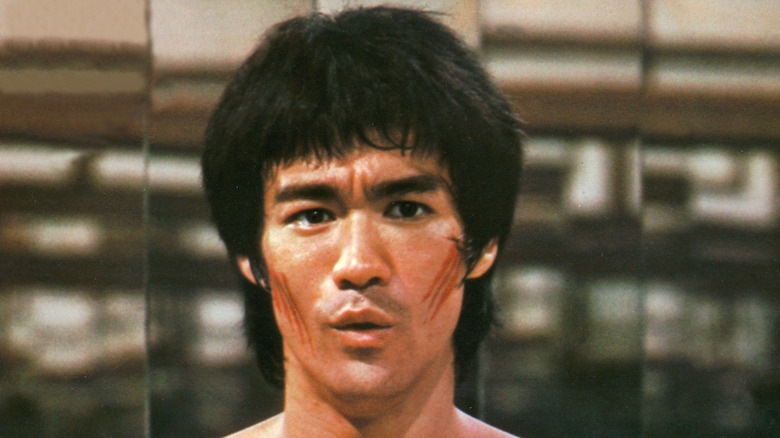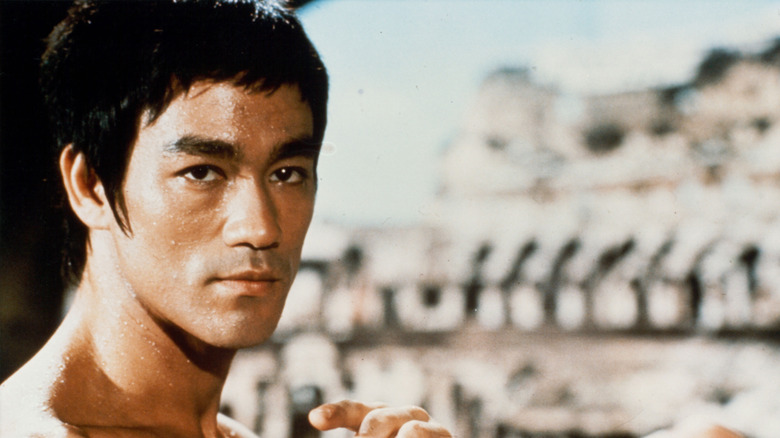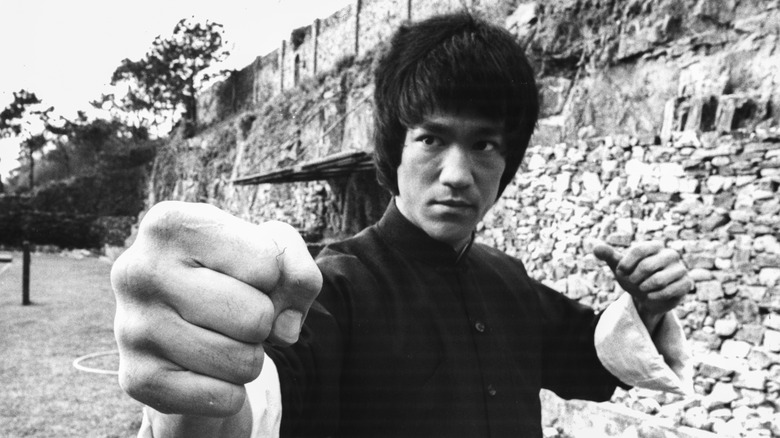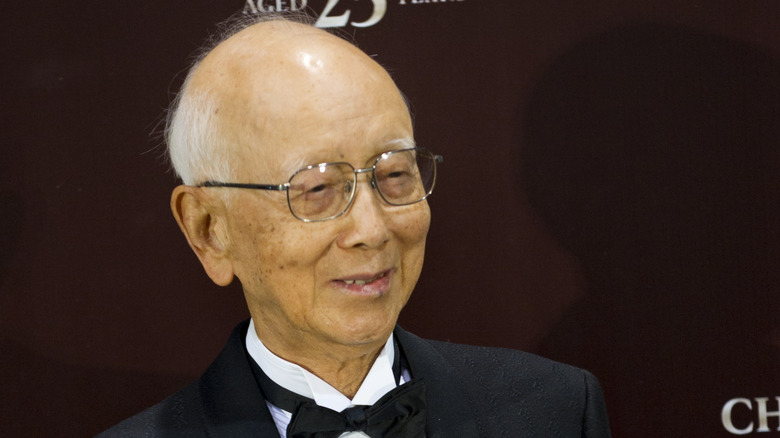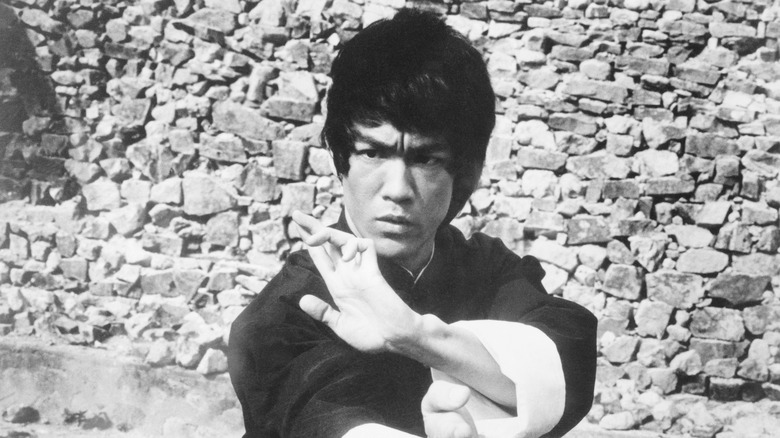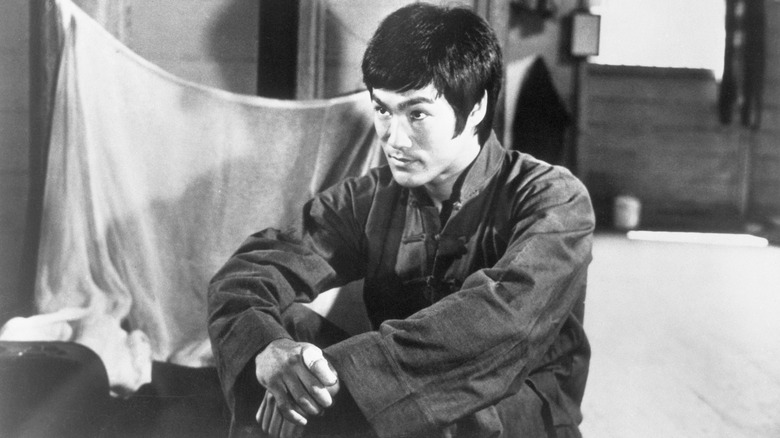The Strangest Theories About Bruce Lee's Death
Bruce Lee's death on July 20, 1973 at the age of just 32 was a major blow to the worlds of martial arts and cinema. It was also an unspeakable tragedy for his young family, with the actor leaving behind him a widow, 8-year-old son, and 4-year-old daughter. Lee was feted for his athleticism and almost supernatural onscreen physique — one of his trademarks at the onset of a fight scene was to tense his lateral muscles, making him appear to expand like a cobra. The news that a star had died seemingly at the peak of physical fitness was, for his many fans, simply unbelievable.
A governmental specialist at the time concluded he died after an allergic reaction to medication, which caused swelling of the brain. Recent studies suggest the swelling was due to hyponatremia, or water intoxication. Death often has a way of turning celebrities into icons, and the timing of Lee's passing ensured that his work and death would both become mythologized in popular culture. He died just prior to the full release of "Enter the Dragon," his big-budget breakthrough into Western cinema, with the tragic news generating a huge amount of interest in the film and its deceased star. Despite the official cause of death being published widely in the mainstream media, rumors spread that Lee had met his end in various bizarre ways, and some still circulate online today.
He was assassinated by the Triads
Perhaps when it comes to the sad deaths of cinema's greatest icons, fans search for a cause that is equally cinematic. Such a compulsion might explain one of the most commonly shared conspiracy theories around Bruce Lee's death: That he was assassinated by the Triads.
The Triads are an assortment of shadowy organized crime syndicates and dangerous gangs that emerged from the secret societies of 18th century China. By the 20th century, they had come to exert great influence throughout Asia and beyond. The Triads are particularly associated with Hong Kong, where Lee was raised as a child, having been born in San Francisco. It was also in Hong Kong cinema that he first became a martial arts movie star, having grown frustrated with his early attempts to break into Hollywood.
According to the conspiracy theorists, Lee's return to Hollywood wasn't simply a result of his star power finally reaching its peak in the United States. Instead, they speculate that he had run afoul of Triad gangsters in Hong Kong, possibly as a teenager when he was partial to street fights. It is said he fought with the son of a gang member, and the fallout forced him to flee to the other side of the globe, where he finished his education and took his first steps into acting. His death, they say, was the result of gangsters finally catching up with him.
He was poisoned by his mistress
Though he was on the cusp of becoming a major movie star in the American market, Bruce Lee died in Hong Kong as he was continuing work on his next feature film, "Game of Death." A statement from the project's production company, Golden Harvest, claimed that he had died while walking with his wife in the garden of his family home. But the truth was that Lee had been at the home of a Taiwanese actress named Betty Ting Pei.
Ting Pei was Lee's mistress, and it was her who gave Lee the medication that reportedly killed him. After taking it, he took a nap in her bed and never woke up. He was dead by the time he was taken to hospital. The details of Lee's final day are notoriously hazy, with speculation at the time suggesting that his brain had been affected my marijuana intoxication (such an idea would be readily debunked today). However, what remained was a rumor that Tang Pei had purposefully poisoned her famous lover out of jealousy.
A more bizarre assertion made by some conspiracy theorists claims that Lee actually died during intercourse, a result of having an excessive amount of sex. This rumor seems to be an expression of the underhand way it was eventually revealed that he had died at the home of his lover. Though Ting Pei did tell author Matthew Polly in "Bruce Lee: A Life" that she and Lee had sex on the day of his death, there is no evidence that the act precipitated it in any way.
He was murdered by his business partner
The idea that Bruce Lee was murdered — and the true details of his death were hidden from the public eye — underpins many of the conspiracy theories that followed. Beyond rumors of shadowy figures from the world of organized crime and a resentful mistress, some came to believe that the increasingly bankable movie star was murdered by his own business partner. Raymond Chow (pictured) was a Hong Kong journalist turned publicist, and his work for Shaw Brothers Studios was instrumental in making kung fu movies a worldwide phenomenon. It was Chow who first signed Lee to the studio in 1971 after spotting his potential in television appearances. It was also Chow who Betty Tang Pei called to her home when she found the star unresponsive. In an attempt to protect Lee's children from scandal, Chow tried to cover up the fact that Lee had died at his lover's residence.
Chow died in 2018 at the age of 91. In his obituaries, his relationship with Lee took precedence among his life accomplishments, which also included the management of Jackie Chan and the promotion of the "Teenage Mutant Ninja Turtles" franchise. However, rumors of his involvement in Lee's death persist online.
He was the victim of a curse
On-screen magnetism and martial arts prowess aside, Bruce Lee is remembered in the West for espousing various strands of Eastern thought through his interviews, particularly those derived from Taoism. Such subjects were unfamiliar to mid-20th century audiences and gave off a sense of mysticism, which fueled theories around his death. Rumor had it that Lee had been the victim of a curse put upon the men in his family after his father was buried in a Catholic church. The icon's uncle, Robert, believed in such a curse and claimed the family had been warned about the interment.
Speculation of a curse affecting the Lee family grew in 1993 when Lee's son, actor and martial artist Brandon Lee, died on the set of his breakout movie, "The Crow." He was killed by a fragment of a makeshift dummy bullet, which was fired from a prop gun while filming his final scenes. "Bruce is dead. My brother Peter is divorced. I am divorced. Now Brandon is dead," Robert Lee told the South China Morning Post in 1993, suggesting that his family was suffering under a supernatural hex.
Jealous martial artists killed him with the 'touch of death'
Bruce Lee's career often presented kung fu as a practice that pushes adherents to the edge of what is physically possible. One of his most famous party tricks was the one-inch punch, a strike that appeared to propel a person backward with minimal recoil. And within martial arts, the existence of an arcane form of combat called "dim mak," or "death touch," has long been speculated.
When executed correctly, the strike is said to set a delayed death into motion. Experts are split on whether such attacks exist in reality. Nevertheless, the rumor that Lee was hit with dim mak has long existed. A year after the star's death, Miami News entertainment editor Alex Ben Block published "The Legend of Bruce Lee," writing that the actor was assassinated by martial arts experts angry that he was sharing the secrets of kung fu with the world. Then again, in the same book Block also suggested that Lee may have been killed by ninja assassins who poisoned him with cannabis. It may be worth taking Block's theories, and those throughout this article, with a grain of salt.
